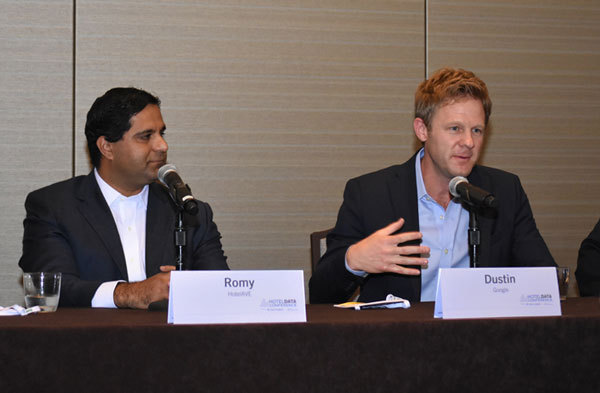✕

Column: industry Tag: hotel industry,AI,BI,guest experience enhancement,revenue generation Published: 2017-09-06 14:02 Source: Author:

Dustin Bomar (right), of Google, speaks about the possibilities of artificial intelligence applications in the hotel industry. Also pictured is Romy Bhojwani, of HotelAVE. (Photo: Bryan Wroten)
NASHVILLE, Tennessee—The hotel industry is rife with data, creating untold opportunities for guest experience enhancement and revenue generation.
The combination of artificial intelligence tools and business intelligence processes can unlock and analyze all of the data that hotel companies receive about guests, but there’s more to it than just plugging in a set of numbers and waiting for a computer to spit out a report. Panelists from the “TMI? No way. AI + BI = Trackable ROI” session at the 2017 Hotel Data Conference?shared what hoteliers need to do to make AI and BI work for them.
Starting out
There’s a lot of “cool stuff” in customer experiences available, said Scott Marvel, managing director, oil & gas sector leader, data, analytics and AI at EY. But doing that requires homogenizing a lot of disparate data sources, he added.
“That has to be done before getting to the AI stuff,” he said.
Once homogenized, the pockets of customer data will let hoteliers turn that information into action, creating meaningful results for guests and clients and improve their experience, Marvel said. That could mean knowing which two people to sit together at dinner or even having facial recognition technology that determines based on a guest’s facial expression he or she needs a drink, he said.
Looking through an owner’s lens, it’s about what kind of insight or actionable items can come from the data, said Romy Bhojwani, EVP of asset management at HotelAVE. His company works with a luxury-branded resort in Orlando, Florida, he said, and it receives 22 reports through the resort’s systems, which requires parsing through for information.
“There’s nothing that says here are the three or five things the data tells us,” Bhojwani said. “Part of what we do is to bring clarity to the data and conversation.”
It’s a matter of gaining insight from the data to know what action to take in order to move the revenue-per-available-room index a few points, he said.
It’s difficult having terabytes of data and then trying to pull out something meaningful, said Dustin Bomar, head of industry, travel at Google. If a guest stays at a Hilton property in Cairo and enjoys a bottle of wine, he said, how does the brand make it happen so that when that guest stays at another Hilton?property in Atlanta, the staff there knows what wine to offer?
With a few exceptions, Bomar said he’s never heard from a hotel owner that the company needs to invest in a data strategy.
“Money ends up going to other things,” he said.
Management companies can execute and owners can push, Bhojwani said, but it’s the brands that drive that discussion around making the investment into technology and systems. The brands can put it in terms of a return for the individual owner, he said.
There needs to be top-down support, Marvel said, and that includes tackling all of the pedestrian stuff first. The grinding work isn’t “sexy or cool,” he said, but companies need to have their data harmonized and mastered.
Setting a strategy
There needs to be an interactive discussion with the owner and operator to determine the story for the investment in this technology, Bhojwani said, and the two parties need to identify what opportunity the data, AI and BI are going to do.
“Otherwise you’re just looking at the data,” he said. “Everyone gets lost in the data.”
The bad news is the hotel industry is behind everyone else in understanding and adopting the technology, Marvel said, but the good news is, the hotel industry has a lot of potential to overtake the field.
“You have the opportunity to leapfrog,” he said. “You don’t have to catch up in a linear fashion. Don’t do a data warehouse. Get right to where it is right now. Don’t set up a huge AI apparatus when there are tools that do that for you.”
The strategy should be all about the customer, Marvel said, and knowing them inside and out. The tools available to help with this are getting cheaper, too.
Take it one step at a time, he said. Don’t use a BI analytics group that just replicates what’s already been done.
“Take advantage of the best and the brightest and the newest stuff,” Marvel said.
The bigger picture is there’s opportunity in sharing data, Bhojwani said. When STR—parent company of Hotel News Now—first started, the company received pushback from hoteliers wary of sharing revenue information, he said.
“As the business gets more sophisticated, and there’s more evolution, we’ve gotten to not just top line but what it means for the bottom line,” he said.
As an industry, hoteliers must be more open of sharing data so everyone can benefit from it, Bhojwani said. It’s good for business because it lets businesses grow smarter and more intelligently analyze the data.
“I can’t tell you enough how many owners and how many brand companies I talk to hold data so close to their chests,” he said. “What are you afraid to lose by sharing your data? As an industry, I think we’ve just got to be more open.”
Bomar seconded Bhojwani’s comments, saying that by holding onto their own data so closely, hotel companies seem “unwilling to use it for their own benefit.”
Previous:TrevPAR Grows but Profits Slide at US Hotels in July
Next:Hilton Garden Inn Updates Brand with New Design and F&B
Hot key words
Hot Products
Popular Vendors